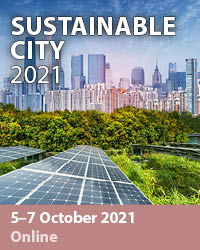
15th International Conference on Urban Regeneration and Sustainability
5–7 October 2021
Bilbao, Spain
Introduction
The 15th International Conference on Urban Regeneration and Sustainability addresses all aspects of the urban environment and aims to provide solutions leading towards sustainability. The Sustainable City 2021 conference follows a series of very successful meetings that started in Rio (2000), followed by Segovia (2002), Siena (2004), Tallinn (2006), Skiathos (2008), A Coruña (2010), Ancona (2012), Kuala Lumpur (2013), Siena (2014), Medellin (2015), Alicante (2016), Seville (2017), Valencia (2019) and Rome (2020).
Urban areas result in a series of environmental challenges varying from the consumption of natural resources and the subsequent generation of waste and pollution, contributing to the development of social and economic imbalances. As cities continue to grow all over the world, these problems tend to become more acute and require the development of new solutions.
The challenge of planning sustainable contemporary cities lies in considering the dynamics of urban systems, exchange of energy and matter, and the function and maintenance of ordered structures directly or indirectly supplied and maintained by natural systems. The task of researchers is to improve the capacity to manage human activities, pursuing welfare and prosperity in the urban environment. Any investigation or planning on a city ought to consider the relationships between the parts and their connections with the living world. The dynamics of its networks (flows of energy matter, people, goods, information and other resources) are fundamental for an understanding of the evolving nature of today’s cities.
Large cities represent a fertile ground for architects, engineers, city planners, social and political scientists, and other professionals able to conceive new ideas and time them according to technological advances and human requirements.
Coastal areas and coastal cities will be an important issue of the conference as they have some specific features. Their strategic location facilitates transportation and the development of related activities, but this requires the existence of large ports, with the corresponding increase in maritime and road traffic and all its inherent negative effects. This requires the development of well-planned and managed urban environments, not only for reasons of efficiency and economics but also to avoid inflicting environmental degradation that causes the deterioration of natural resources, quality of life and human health.
The meeting always attracts a substantial number of contributions from participants from different backgrounds and countries. The variety of topics and experiences is one of the main reasons behind the success of the series.
All papers are included in the WIT Transactions and archived in the Wessex Institute eLibrary at https://www.witpress.com/elibrary, where they are permanently and easily available to the international community.
Conference Topics
The following list covers some of the topics to be presented at Sustainable City 2021. Papers on other subjects related to the objectives of the conference are also welcome.
- Urban strategies
- Urban logistics
- Urban metabolism
- Circular economy at the city level
- The coastal city and its environments
- City/Waterfront interaction
- Planning, development and management
- Waterfront development
- The S3 city: smart, sustainable and safe
- Eco-town planning
- Spatial conflicts in the city
- The community and the city
- Tourism and the city
- Coastal city beaches
- Coastal processes
- Coastal flooding
- Urban transportation and planning
- Ports accessibility
- Architectural issues
- Cultural heritage sites
- Urban conservation and regeneration
- Environmental management
- Waste management
- Urban air pollution
- Health issues
- Water resources
- Landscape planning and design
- Urbanization of rural areas
- Urban agriculture
- Planning for risk and natural hazards
- Case studies